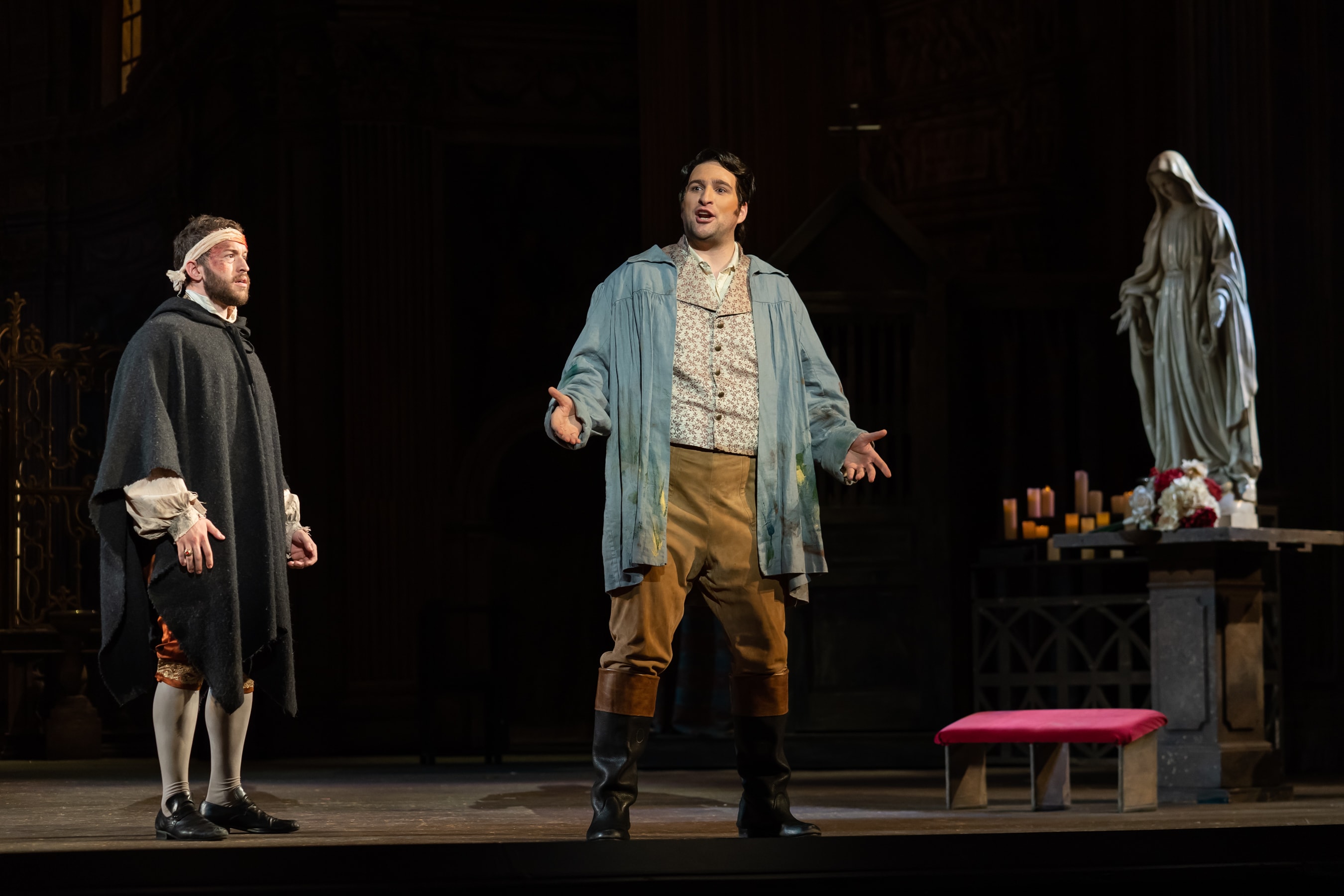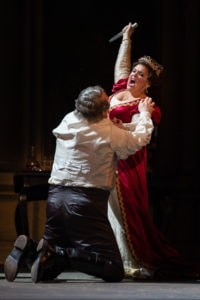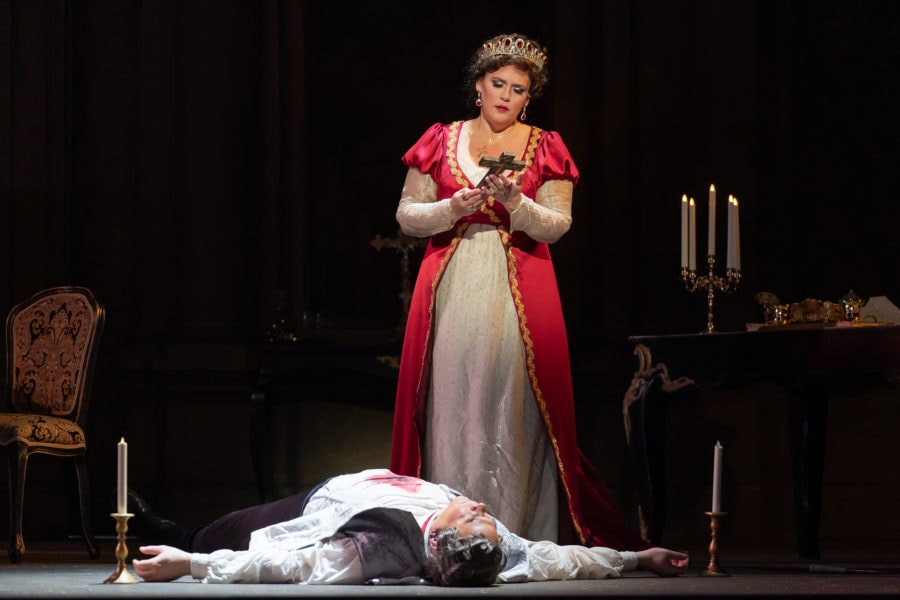The Washington National Opera’s (WNO) fine opening night performance of Puccini’s Tosca provided an opportunity for catharsis and reflection, two things our overwrought city needs right now.

My stomach tightened upon hearing the ominous tritone announcing evil was coming as the curtain rose. It felt familiar, and not just because Tosca is classic opera comfort food: plenty of melodrama, great singing, and great tunes, but because like the Romans in 1800, when the story is set, we here in modern-day DC know what it’s like to experience the ominous sense that a flash flood of forces beyond our control could sweep us into terrible predicaments at any moment.
Based on Victorien Sadou’s play, La Tosca, the opera is set against the backdrop of European turmoil thanks largely to Napoleon and his bellicose adventures. The populist hero turned despot has by now occupied the Papal States, sending the Catholic church into retreat. In his bid to control the entire Italian peninsula, he is engaged in battle further north, leaving a power vacuum in Rome, now filled by the sadistic chief-of-police Baron Scarpia, sung with a baleful, sustained anger in this performance by the American baritone, Alan Held.
Scarpia lusts after the volatile Roman opera singer, Floria Tosca, sung with mesmerizing clarity by the American dramatic soprano and Domingo-Cafritz Young Artist Program alumna, Keri Alkema. Tosca’s lover, Cavaradossi is a patriotic French artist sung in this performance by Italian tenor Riccardo Massi, in his WNO debut. I imagine Massi would have brought Puccini himself into paroxysms of glee as the tenor nailed every note of both arias written for the starry-eyed but doomed hero, and did so with a bit of squillo to boot. Massi and Alekma also blended voices quite nicely.
Despite his unswerving faith in Napoleon’s now hollow “liberty, equality, fraternity”, Cavaradossi’s livelihood depends on commissions from the hierarchical church. He fatally mixes the two by hiding the revolutionary fugitive Angelotti in a chapel where he is painting a mural. Angelotti is sung comfortably by American baritone, Michael Hewitt, also a Young Artist Program alumnus.
When Scarpia’s men discover evidence linking Angelotti to Cavaradossi, Scarpia’s fast but shallow mind instantly devises a plan to capture and kill Angelotti, torture and kill Cavaradossi, and mentally torture and rape Tosca, and all within the space of 24 hours. Held’s fulminating Scarpia sings on about himself, his needs, and all the horrible things he alone will do. He sings of the arousal he feels from stoking hatred in Tosca before he ravishes her.

Under the baton of Italian conductor Speranza Scappucci, the orchestra occasionally overpowered Scarpia, but he was still terrifying.
In previous productions of Tosca I’ve seen elsewhere, I related to the characters more in theory than as allegory. This time, Puccini’s skillful use of melody to carry big emotion throughout the score mixed with thoughts of current events in my mind, so that I was invested fully in the near three hour torrent of jealousy, fear, terror, anxiety, rage, anguish, hate, and love.
I do not believe I was alone in this. The cast’s stupendous singing brought cheers throughout, and a standing ovation at the end. Yet, I suggest what also resonated was the chance this excellent performance gave us to unleash a collective sigh against these same exhausting, and unrelenting emotions we’ve been feeling, or are constantly made aware others feel, in this moment in time when the political machinations are just as complicated and high stakes as they were for 1800 Romans.
That’s not to say the show makes us feel better. It’s unsettling to know that once Scarpia’s sadism is unleashed, even his demise cannot prevent the resulting doom. It is also dispiriting to see how the main characters delude themselves into thinking they are in control of their situations, leading them all to a fatal moment of compromise. This makes them all, hero and villain alike, complicit in their respective downfalls.
My only complaint with this production is minor. The surtitles move too quickly, allowing the audience to read and react to lines yet to be sung. This did not seem to impact the singers’ dramatic reflexes, but perhaps in future this can be corrected.

I also would like to note that the Chinese basso Wei Wu as the Friar Tuck-like Sacristan and American tenor David Cangelosi as Scarpia’s cowering lackey were well cast and added nicely to the show’s texture.
Directed by American Shakespeare Center’s Ethan McSweeny, with lighting by Gary Marder, it is an elegant production that includes Seattle Opera’s historic “wing and drop” Ercole Sormani-painted trompe l’oeil sets.
Running time: 2 hours, plus 2 twenty five-minute intermissions.
The Washington National Opera’s Tosca plays through May 25, 2019, at the Kennedy Center – 2700 F Street, NW, in Washington, DC. For tickets, call the box office at (202) 467-4600 or go online.




